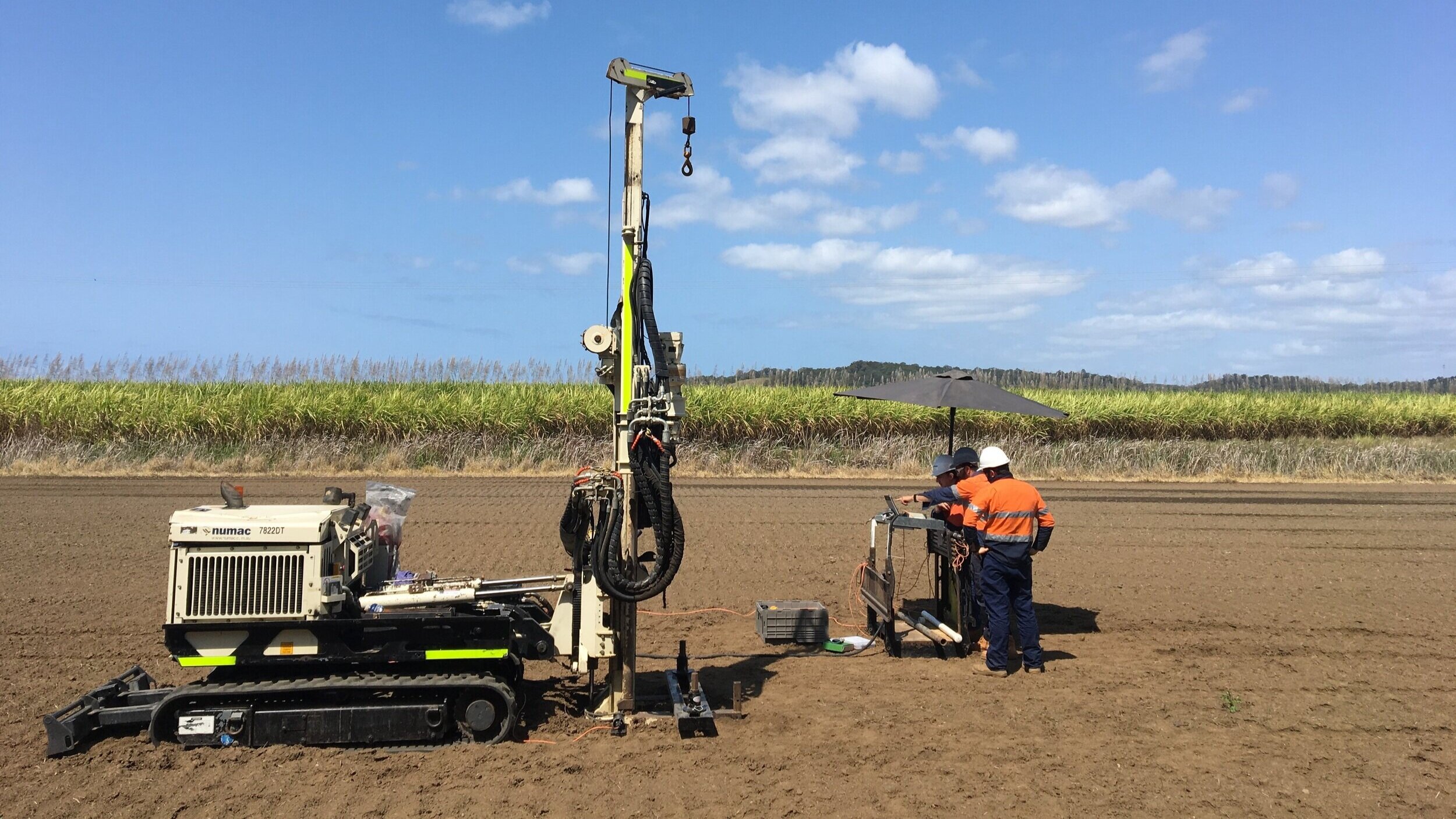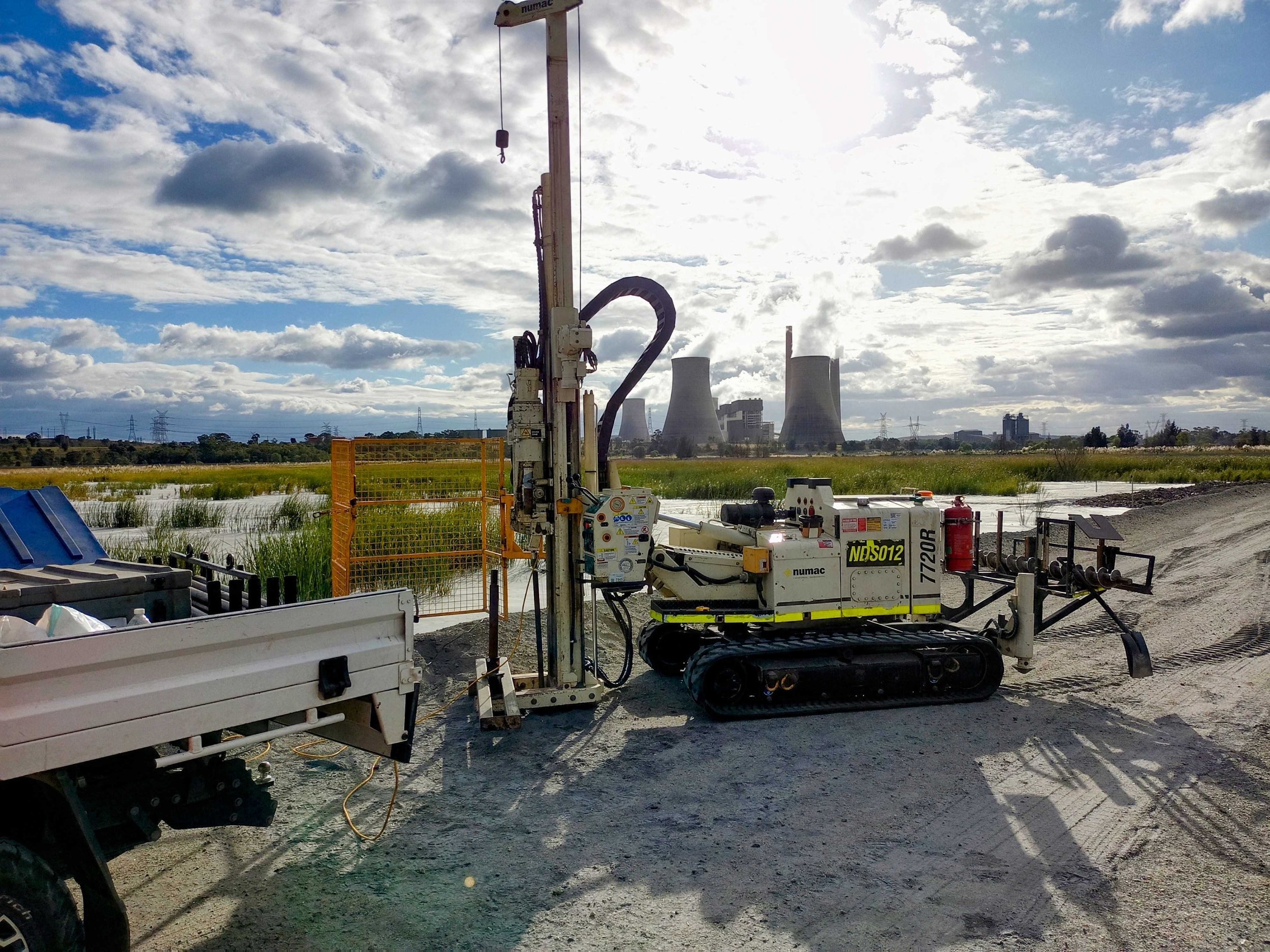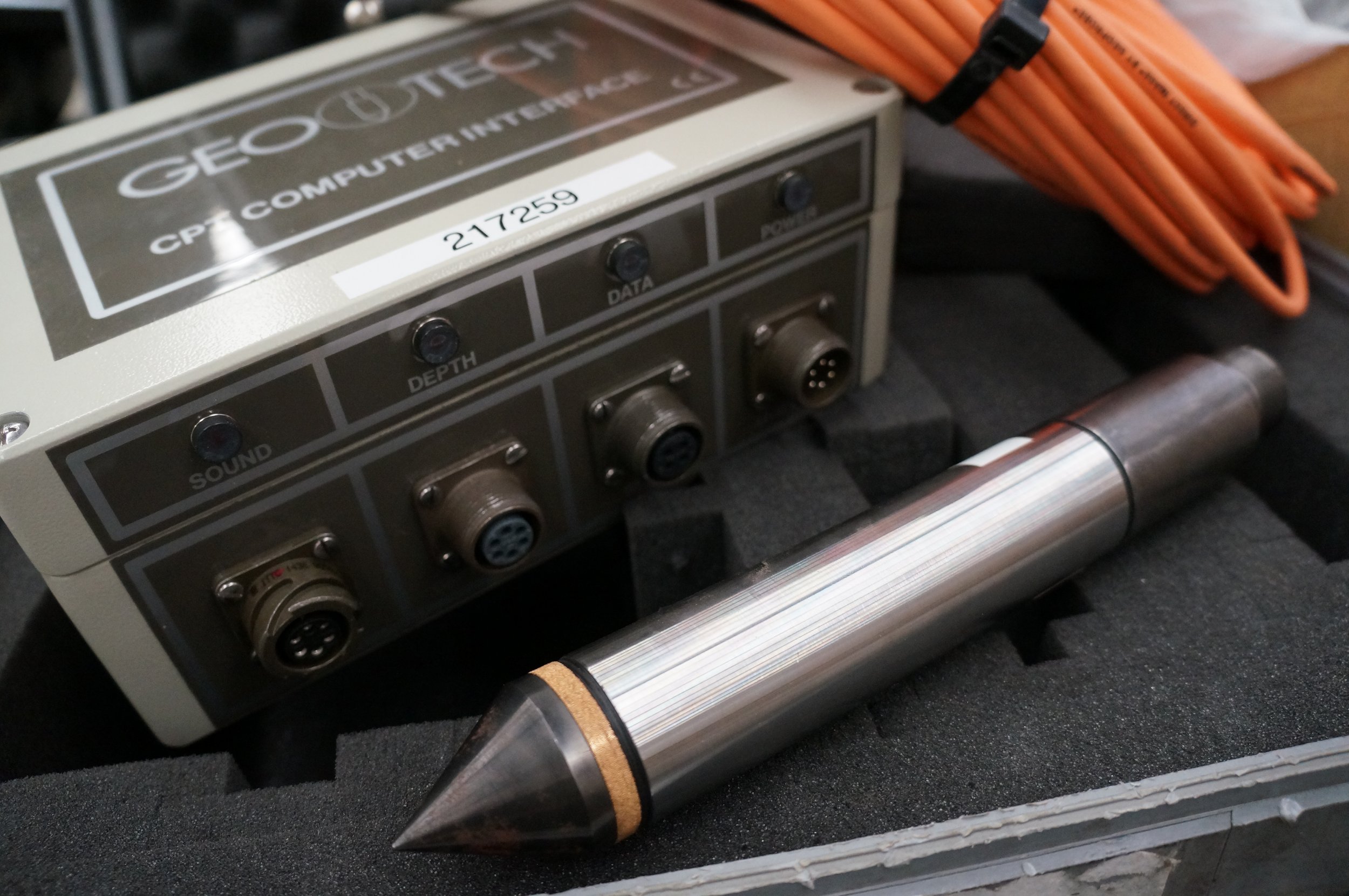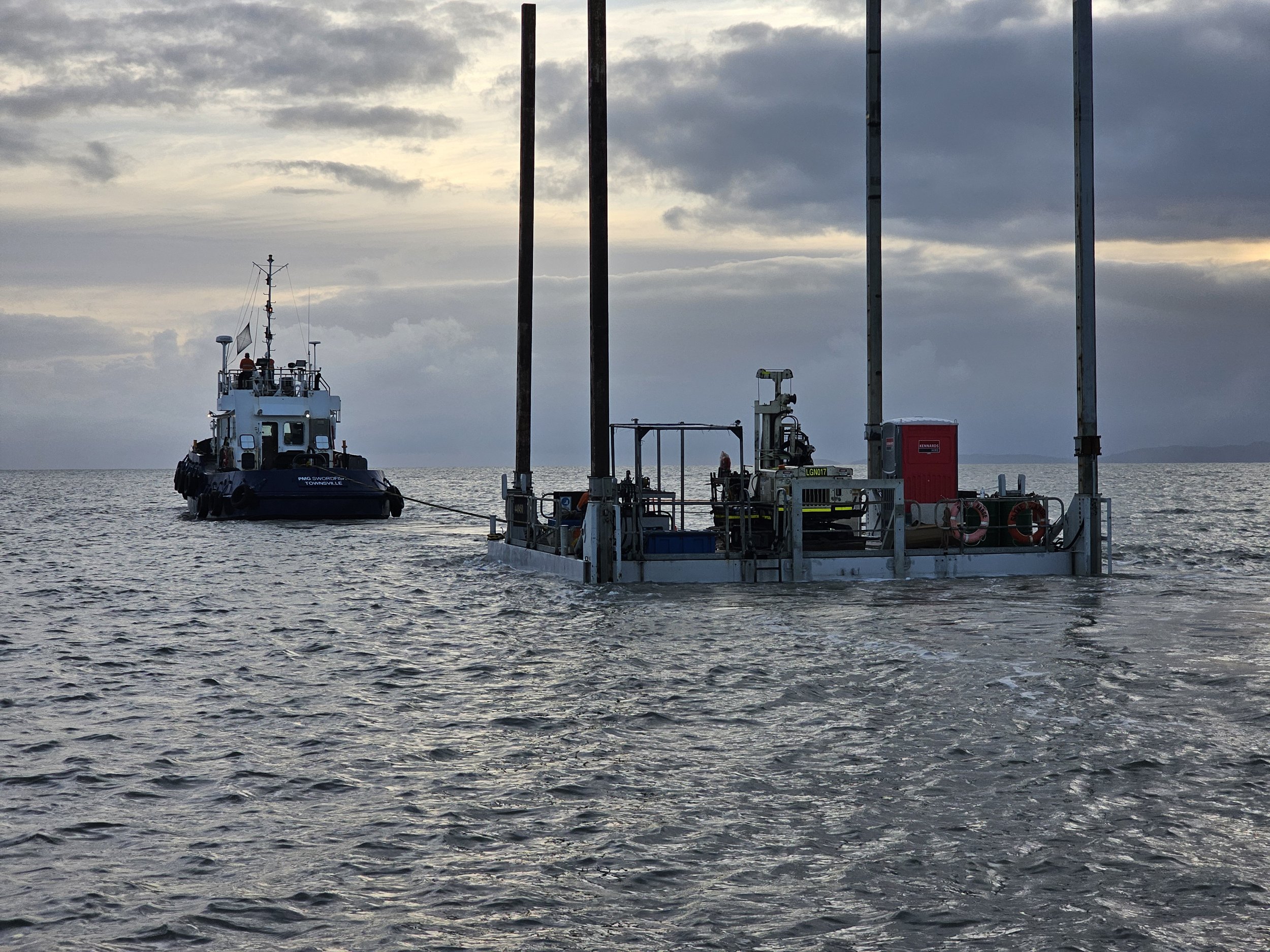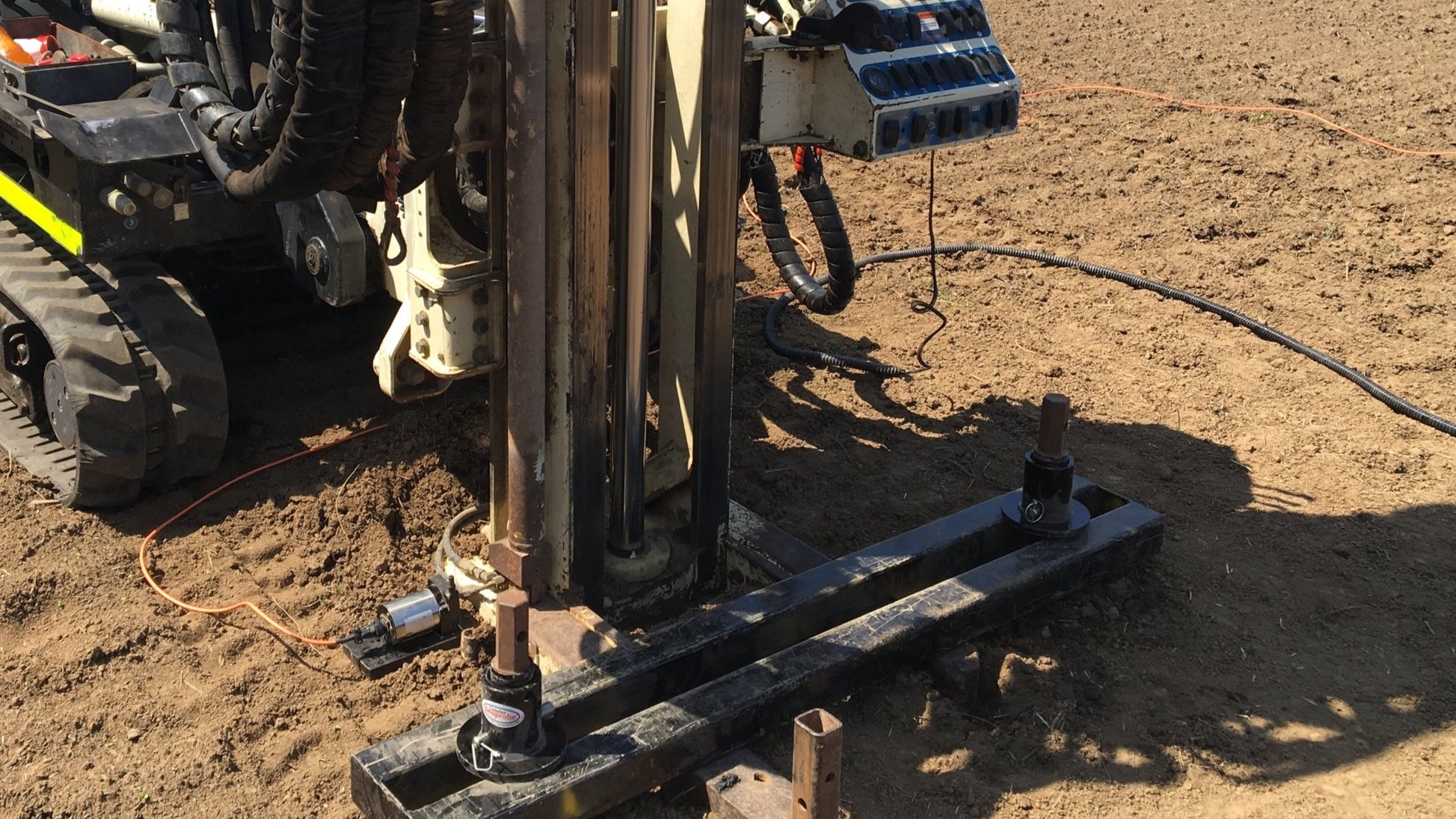
Cone Penetration Testing (CPT) Services
Cone/Piezocone Penetration Test (CPT/CPTu)
Webinar with Geomil on CPTu fundamentals covering best practices in Cone Penetration Testing.
Cone Penetration Test (CPT): A Trusted Solution for Tailings and Geotechnical Site Investigations
The Cone Penetration Test (CPT) or cone penetrometer testing is a widely used in-situ testing method for tailings and geotechnical site investigations, valued for its high production rates, repeatable measurements, and near-continuous profiling of critical geotechnical parameters. This reliable method is essential for understanding soil behaviour type. Geotech Cone Penetration Testing can be conducted from the ground surface using various rigs or over water from barges and platforms.
Legion Drilling: Leaders in CPTu Geotechnical Testing Across Australia
Legion Drilling provides Cone Penetration Testing with pore pressure measurement (CPTu) for geotechnical applications across Australia. Our experienced operators comply with International best practice and employ testing methods to deliver comprehensive data on soil strength, soil type, and other critical geotechnical properties, supporting projects in diverse industries, including mine tailings, construction, and infrastructure.
Geoprobe tracked CPT rig completing Cone Penetration Tests (CPT) in QLD Australia. Our tracked all purpose rigs allow for in-situ testing (CPT, Seismic CPT, DMT, VST) as well as soil sampling and instrument installation in a single package.
Cone Penetration Testing ash dam tailings storage facility in NSW Australia with the Geoprobe 7822. Great platform for getting around soft tailing and difficult access cone penetration test sites.
Cone Penetration Testing (CPT) is an excellent option for nearshore barge geotechnical investigations due to the following key reasons:
Efficient and Continuous Soil Profiling
CPT provides real-time, continuous data on soil properties, unlike traditional boring methods, which rely on intermittent sampling.
This allows for a detailed understanding of stratigraphy, crucial for designing foundations for piers, docks, and offshore structures.
High Accuracy and Reliability
CPT directly measures tip resistance (qc), sleeve friction (fs), and pore water pressure (u2), offering a highly accurate assessment of soil strength and consolidation characteristics.
Results are less affected by operator variability compared to standard penetration tests (SPT).
Minimal Disturbance to Soil Samples
Since CPT is a pushed-in method, it avoids the sample disturbance issues that can occur with traditional drilling techniques, preserving in-situ soil conditions.
Faster Data Collection
CPT is significantly faster than conventional borehole drilling, enabling rapid assessment of multiple test locations within a short timeframe.
This efficiency reduces the overall cost of the geotechnical investigation.
Ability to Operate from a Barge
CPT rigs can be mounted on barges, making them well-suited for nearshore environments where land-based drilling rigs are impractical.
Specialized seabed or seafloor CPT rigs (e.g., seafloor penetrometers) can be deployed for deeper offshore testing.
Enhanced Geotechnical Characterization
CPT can detect soft clay layers, loose sand zones, and variations in soil stiffness, which are critical for designing foundations for offshore platforms, mooring systems, or breakwaters.
Additional sensors (e.g., seismic CPT, resistivity CPT) provide insights into liquefaction potential, sediment composition, and soil strength.
Reduced Environmental Impact
Compared to drilling and sampling, CPT produces minimal disturbance and waste, making it a more environmentally friendly option in sensitive marine environments.
Pore Pressure Measurement for Marine Sediments
CPT with piezocone (CPTu) technology measures pore water pressure, helping to assess consolidation behavior, drainage conditions, and potential instability in marine sediments.
For nearshore barge geotechnical investigations, CPT stands out as a fast, reliable, and cost-effective method that provides high-resolution soil data with minimal environmental impact. It is especially beneficial for projects involving piles, caissons, or dredging assessments, where precise soil characterization is crucial for engineering design.
Comparing CPT (Cone Penetration Test) to SPT (Standard Penetration Test)
The Cone Penetration Test (CPT) and Standard Penetration Test (SPT) are both widely used geotechnical investigation methods, but they differ significantly in terms of procedure, data output, and applications. Here's a detailed comparison:
Use CPT when:
High-resolution, continuous data is needed for stratigraphy and soil properties.
Investigating soft soils like clays, silts, and sands.
Speed and automation are important.
Use SPT when:
Sampling is required for laboratory analysis.
Gravelly or dense soils are present.
Budget constraints or equipment availability limit the use of CPT.
Both methods have their place in geotechnical investigations, and their selection often depends on the project's requirements, soil conditions, and budget. In many cases, they are used complementarily to leverage the strengths of each method.TECHNICAL WEBINAR ON CPT
Ernst Wassenaar from Geomil presented this technical session on CPTu in May 2022. It is part of our series of webinars on advanced site characterisation and remediation.
Further Information on Cone Penetration Testing:
Our field technicians will be happy to provide further information and discuss in detail any specific project requirements.
In the meantime, we recommend you consult the following documents:
Lunne, T., Powell, J. J., & Robertson, P. K. (2002). Cone penetration testing in geotechnical practice. CRC Press.
Robertson, P. K. (2012). Interpretation of in-situ tests—some insights. J. K. Mitchell Lecture, Proceedings of ISC’4, Recife, Brazil. https://www.cpt-robertson.com/PublicationsPDF/Robertson%2C%20Mitchell%20Lecture%2C%20ISC'4%2C%202012.pdf
Robertson, P. K., & Cabal, K. L. (2015). Guide to cone penetration testing for geotechnical engineering (6th Edition). Gregg Drilling & Testing. http://www.greggdrilling.com/wp-content/uploads/2017/07/CPT-Guide-6th-Edition-2016.pdf
Key Features of CPTu Testing:
- High-Quality Subsurface Data: CPT systems use a cone penetrometer pushed into the ground at a standard rate, recording electronic measurements at regular intervals and overcoming limitations associated to sample disturbance.
- Advanced Measurement Capabilities: Electric CPT probes measure cone resistance at the tip and sleeve friction during penetration, while CPTu (piezocone penetration testing) also records pore water pressure for enhanced analysis.
- Seismic Testing Modules Our SCPTu systems provide compression and shear wave velocity data, essential for seismic site characterization.
Comprehensive Geotech CPT Services: Advanced Cone Penetrometer Testing
Legion Drilling specializes in geotechnical CPT services, providing high-precision cone penetrometer testing (CPT) for a variety of industries. Our state-of-the-art CPT test rigs offer fast, reliable penetration testing for geotechnical site investigations, tailings dam stability assessments, and nearshore marine environments.
Leading CPT Services for Comprehensive Geotechnical Investigations
Our CPT testing services integrate advanced cone penetration test equipment to deliver superior geotechnical insights. Legion Drilling’s multipurpose CPT rigs are designed for:
Direct Push Sampling – Rapidly collect geotech soil samples for detailed laboratory analysis.
Drilling & Testing Services – Perform auger drilling, rotary air drilling, and direct push sampling to support the installation of:
Geotechnical instruments for subsurface monitoring
Groundwater monitoring wells
Inclinometers and additional cone penetrometer test monitoring systems
Specialized Cone Penetration Testing for Unique Environments – Including high-compliance mining, defence sites, tailings dams, and nearshore marine projects where CPT services ensure accurate penetration test data for complex geotechnical conditions.
Why Choose Legion Drilling for Cone Penetration Testing?
With strategically positioned depots in Brisbane, Sydney, and Townsville, Legion Drilling provides CPT services across Australia. Our highly skilled geotech professionals operate state-of-the-art cone penetrometer testing equipment, delivering precise, repeatable CPT test results to support critical decision-making in geotechnical engineering.
From geotech site investigations and mine tailings stability assessments to seismic cone penetration testing and nearshore marine geotech surveys, our expertise ensures comprehensive CPT testing solutions for even the most challenging environments.
Key Benefits of Our Cone Penetrometer Testing Services
✔ High-resolution cone penetration testing (CPT) for continuous geotech profiling
✔ Rapid penetration test data collection (20 mm/s) for efficiency
✔ Real-time visualization of CPT test results
✔ Seismic CPT (SCPTu) compatibility for enhanced geotech analysis
✔ Integrated inclinometer for cone penetrometer test deviation monitoring
✔ Adherence to international geotech testing standards for reliability
✔ Specialized cone sensors for very soft soils, mine tailings, and marine sediment penetration testing
✔ Light track-mounted CPT rigs for accessibility in remote or difficult terrains
CPT Testing for Tailings Dams & Nearshore Marine Environments
Tailings Dam Stability Testing – Our CPT services provide detailed penetration test data to evaluate mine tailings behavior, settlement risks, and long-term stability.
Nearshore Marine CPT Testing – We specialize in marine cone penetrometer testing, essential for port construction, offshore foundations, and seabed geotech analysis.
For precision cone penetration testing, geotechnical investigations, and specialized CPT services, trust Legion Drilling to deliver industry-leading CPT test solutions tailored to your project’s geotech requirements..

